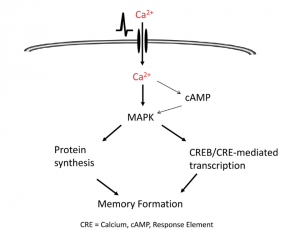
Background
“Sleep is important.” Most individuals have heard the aforementioned phrase before, but many individuals do not understand just how important sleep is for memory. Memory can be defined as the way in which the brain takes external information and processes it to store and recall for later. A short-term memory, such as a new term learned in a class, can be modified into a long term memory through long-term potentiation (LTP), which is called memory consolidation.
Memory consolidation:
In the brain, memory consolidation is influenced by the hippocampus during the fourth sleep stage. The memory formation during sleep is described in Figure 1.
The process of memory occurs via NMDA (N-methyl D-aspartate) receptors, which is a type of receptor that opens after being AMPA receptors have depolarized the cell membrane and both are glutamate receptors. After NMDA receptors are activated, calcium enters the neuron through receptor, ultimately initiating transcription and translational pathways responsible for forming memories.

Calcium then activates AC to cyclase ATP into cAMP, a second messenger. Calcium and cAMP further work to activate MAPK (mitogen-activated protein kinase) to induce CRE (calcium response element) mediated transcription and protein synthesis.
How does this pathway involve sleep?
REM (rapid eye movement) sleep is the fourth sleep cycle after NREM (non-REM) sleep cycles one through three. REM sleep aids in maintaining memories by reactivating the processes required for memory formation to reconsolidate memories as described above. REM sleep is typically the stage of sleep that the brain is the most active.
During REM sleep when the brain is active, the same neurons that were firing when learning during the day are re-firing to demonstrate long-term potentiation to make the memory stronger. The chronic re-firing of neurons in the same patterns as when the information was taken in from the environment can also promote memory persistence.
Memory persistence:
Memory persistence is a more long-term solution to memory consolidation. In electrophysiological tests, specific action potential patterns occur in the same way when someone is learning and when someone is sleeping to amplify memory persistence. In neurons, the proteins that are responsible for storing memories have a lifespan much shorter than long-term memories, which is exact what memory persistence aims to understand. In memory persistence, the NMDA receptors are constantly being synthesised. Persistent synthesis is required in conjunction to BDNF (brain-deprived neurotrophic factor) synthesis. BDNF is synthesized with CRE is activated and the synthesis occurs approximately 12 hours after learning. BDNF is significantly downregulated in neurodegenerative diseases, such as Alzheimer’s disease, showing that BDNF is associated with learning and memory.
Other brain structures involved:
Hippocampal memory formation relies on the suprachiasmatic nucleus in the hypothalamus for activating AC (adenyl cyclase) pathways during circadian rhythms. Lesions in this reduced memory formation, which could have long-lasting impairments on memory, which just demonstrates that the suprachiasmatic nucleus works with the hippocampus to ensure that memories can be formed.
So what?
Sleep is necessary for learning and forming memories, as well as keeping memories stored for later use. College students are notorious for pulling all-nighters and depriving their brains of the much needed REM sleep required to consolidate memory in order to remember the content that students are going into debt to learn. Therefore, college students should stop pulling all-nighters and prioritize sleep to fully take advantage of their college educations.
Sources:
- https://www.ncbi.nlm.nih.gov/pmc/articles/PMC3898677/
- https://www.sciencedirect.com/science/article/pii/S0168010217302377?via%3Dihub
- https://www.ncbi.nlm.nih.gov/pmc/articles/PMC2772165/
- https://aasm.org/college-students-getting-enough-sleep-is-vital-to-academic-success/
